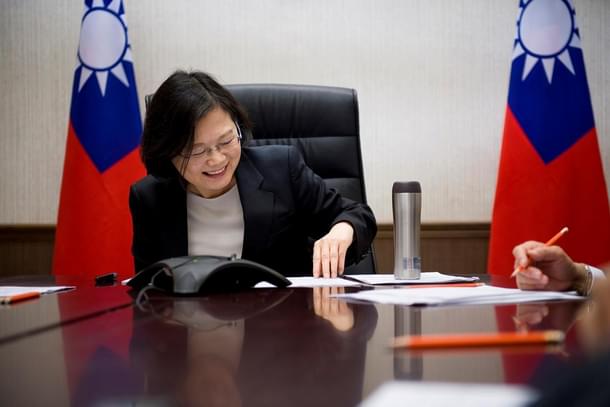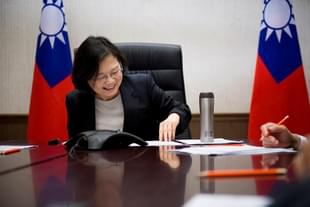World
Taiwan's President Tsai Ing-wen Resigns As Head Of Ruling Party After Kuomintang's Return In Local Elections
Swarajya Staff
Nov 27, 2022, 11:24 PM | Updated 11:24 PM IST
Save & read from anywhere!
Bookmark stories for easy access on any device or the Swarajya app.


Taiwan's President Tsai Ing-wen has resigned as head of the governing Democratic Progressive Party after her party's poor performance in local elections.
The opposition Kuomintang (KMT) won multiple major races, including the capital city of Taipei.
The vote has been followed more closely than previous local elections as Taiwan has become a bigger geopolitical point of friction between Beijing and and Washington DC.
According to reports, Tsai had framed the election as a vote for democracy amid rising tensions with China.
"The election results were not as expected... I should shoulder all the responsibility and I resign as DPP chairwoman immediately," said President Tsai Ing-wen. She will continue as president of the self-ruled island.
Technically, the elections for local councils and city mayors have a domestic focus. The focus is on issues such as crime, housing and social welfare. People who have been elected, need not have a direct say on Taiwan's policy regarding China.
However, Ms Tsai and government officials campaigned by telling voters to use there vote at the ballot to send a message about standing up for democracy, as Beijing increases pressure on the island.
Taiwan also conducted a referendum along with the local elections and the matter up for vote in the referendum was weather voting age should be lowered from 20 to 18.
Voters decided against lowering the age.
The Chinese government claims Taiwan is a breakaway province that will, eventually, be 'reunited' with the mainland. Since the formation of the Communist polity in mainland, Taiwan has not been ruled by Beijing.
Taiwanese consider their self-ruled island - with its own form of government and a democratic system - separate from China.
China-Taiwan tensions escalated even more when US House Speaker Nancy Pelosi visited Taiwan, which triggered military drills by Beijing.
The US policy on Taiwan is known as 'strategic ambiguity'. Technically, it has no formal ties with Taiwan, however, it has pledged to supply the island with defensive weapons and stated that any attack by China would cause "grave concern". US President Joe Biden has in fact, on multiple instances, said that US would defend Taiwan. These statements have been walked back by the White House.
Taiwan has two main political parties and their approach to China differs.
The Kuomintang (KMT), a party of conservative business champions, is seen as a party of pro-China "doves".
They have argued that Taiwan should have deeper economic engagement with China and they are not against 'unification'. They themselves vehemently reject the pro-China label.
The other party is the governing Democratic Progressive Party (DPP). Ms Tsai won the 2020 national election with a landslide, as a candidate for the DPP.
DPP has a hawkish stance towards China. During her election campaign, she promised to stand upto China. She has said that Taiwan will not bow to Chinese pressure and she has also said that Beijing needs to show respect to Taiwan.
DPP won fewest seats in local elections in 36-year history.
As of now, it is not clear if her party's lacklustre performance in the local elections is a sign that people in Taiwan do not want to poke China or that there were other local factors which played a role in the electoral outcome.





